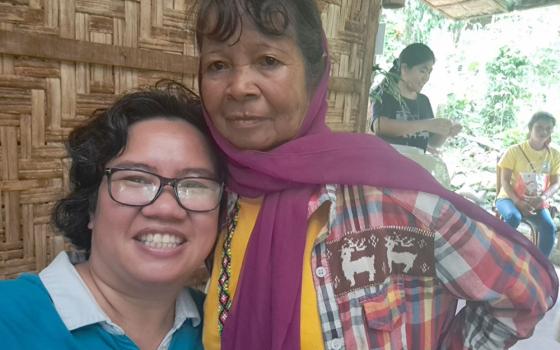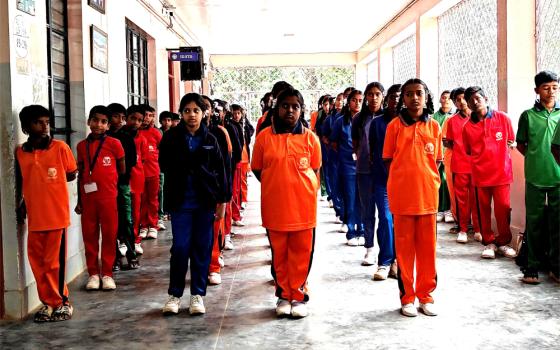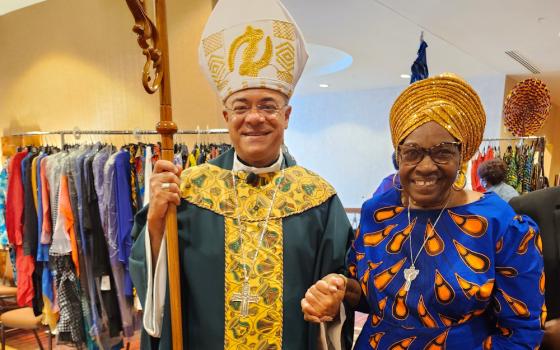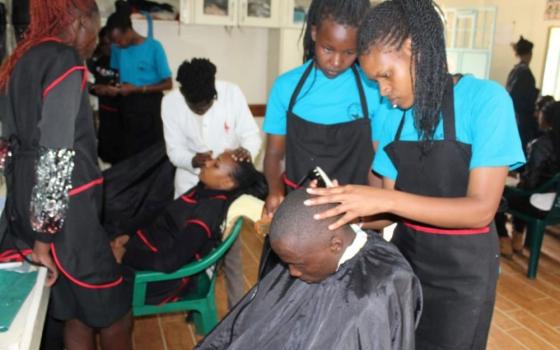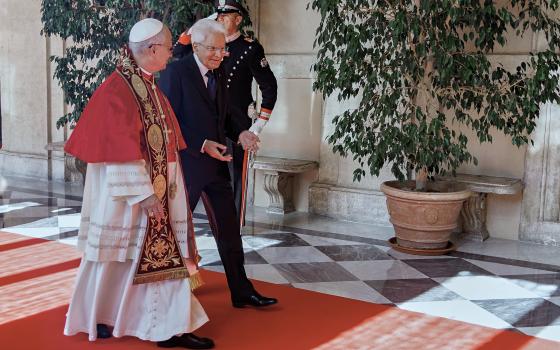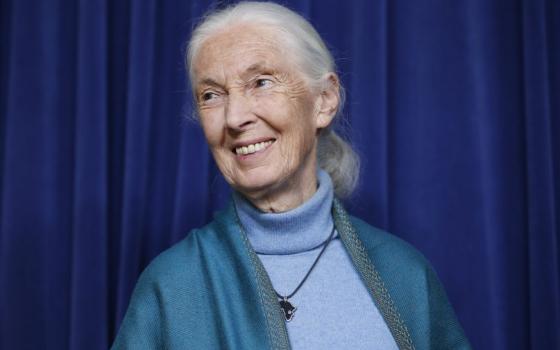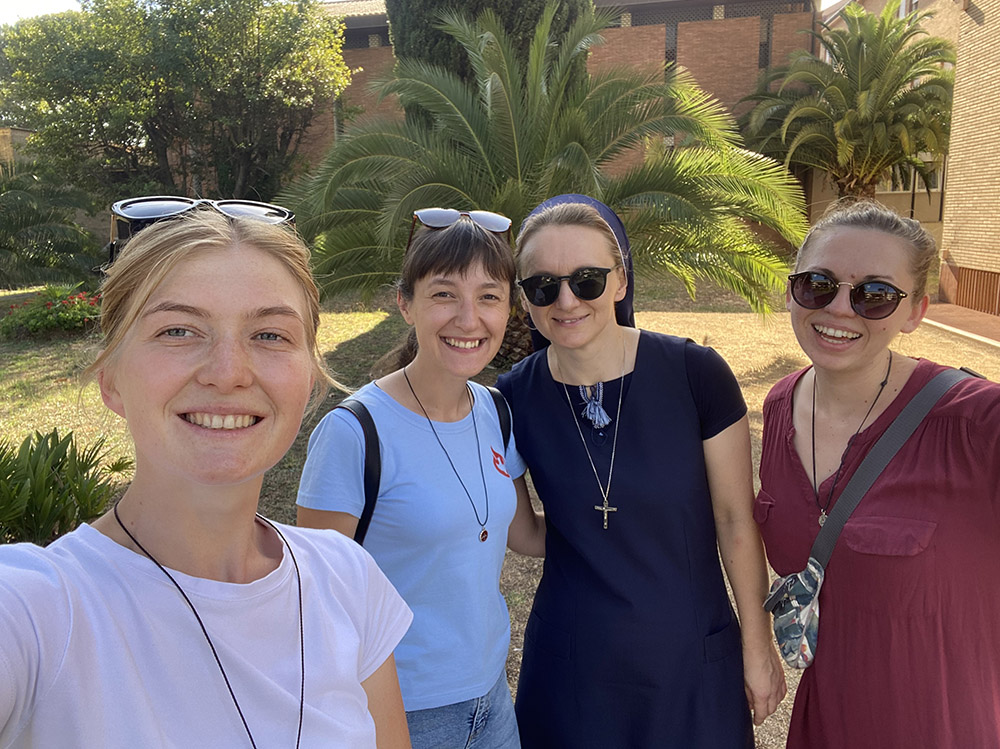
Missionary Sisters Servants of the Holy Spirit novices Liudmyla, Mariia and Anna, with formation director Sr. Svitlana Matsiuk (third from the left) at their formation center in Rome. Two of the novices are from Ukraine and one is from Poland. (Courtesy of Svitlana Matsiuk)
In August 2022, I came to Rome from Ukraine to work in the European novitiate of our missionary congregation. Something new was starting in my religious life.
Our congregation — the Missionary Sisters Servants of the Holy Spirit — was founded in 1889 in the Netherlands. Arnold Janssen, a German priest, started it there and not in Germany, where the Catholic Church was persecuted at that time. He saw the need in mission countries for a missionary women's congregation.
Since our foundation, we always had an abundance of young, highly motivated women eager to become missionaries, to serve Christ in the poor, sick and marginalized. In some countries, the novitiate groups were really large, with 70-80 people.
But the situation changed in the last few decades. The number of vocations in Western Europe was already shrinking in the 1990s, and Eastern Europe soon followed. For some of our provinces, it is a shocking experience not to have anyone in initial formation. The huge houses built to prepare new missionaries for service somewhere far away from Europe now have become too big, lacking young sisters with their powerful voices and energy.
With time, it became clear that preparing individuals in their own countries and provinces is challenging, since young people need a peer group to mature, share their talents and energy, or just to know that they are not alone on this journey.
Now, to become a religious in both secular Western European countries as well as in more traditional Eastern Europe demands strong will, determination and courage to go against the usual "normal" lifestyle. Young people who feel they are called for this adventure of religious life often oppose their family's and friends' expectations, and face misunderstanding and disappointment from people very dear to them.
In this case, a peer group is essential, as well as friendship — which often happens as a result of earnest sharing of one's own motivation for God's call.
Once after nine years of my religious life, when I was in the missions, I talked by phone with my grandmother. She told me that she fell and hurt herself badly. She said that God punished her for opposing me when I wanted to join the congregation.
I replied that God surely has a very good memory — that after nine years he decided to get revenge! I started laughing, and my grandmother as well.
She remembered her bitter tears when I was leaving home and going to a remote place to join my new community. That moment was very hard for both of us. This choice of life is a big step that changes everything.
Advertisement
In his reflections about the future of the church, then-Fr. Joseph Ratzinger predicted that the church will be more spiritual; it will lose much, but people who choose to be in the church will live from their deep faith.
His prophecy can explain the changes taking place in religious life as well. There will not be huge numbers of people entering convents; it will not be possible to do as much as we used to do.
On the one hand, it is a chance for the formation of religious to become more personal and to reach the core of a person who wants to imitate Christ. And on the other hand, it is a big chance to evaluate and to change our style of life.
Once a sister shared with me that as novices they cleaned the floor of their big convent two times a day because there were so many in the novitiate that it was hard to find work for them. The floor of the convent was shining more than in a museum, and the extreme cleanliness became habitual.
After experiencing the lack of vocations, we have become humbler, realizing that our future is really not so secure, and we stopped looking down on young women who have the courage to join us. They are no more inexperienced, impractical girls who need to be taught everything. Now we take them seriously, respecting their life story and their relationship with God. They teach us to be more human and not machines that perfectly fulfill our duties.
This time is a special kairos for us, a gift from our loving God and an invitation to look once again at Jesus and follow him.
After having realized that the old times with many vocations will not come back and it is useless to mourn and dream about it, we started to discern this new reality for ourselves. We discerned an idea for a common novitiate formation program in Europe, and the first novitiate group started in 2014.
It makes it possible for women from our different provinces in Europe to be in a peer group, to grow in their faith and in their self-awareness, to experience their vulnerability and to build relations in their community.
They are aware of the challenges that they have to face in the mission and in the church. We try to prepare mature people who love Christ and want to give witness of their faith to the world.
Our novices from different countries, different church traditions and different backgrounds learn and grow together as one community.
Since this program is in Rome, it is a perfect chance to learn the places connected with the first Christian communities here. We experience being in the heart of the church, learning her richness and great wisdom.
Italian Canossian Fr. Amedeo Cencini, a well-known formator and author, often says that crisis is an opportunity for growth. Without challenges, we would not mature.
The lack of vocations is a chance for us to trust God and let the Holy Spirit change everything in our structures and hearts that takes life and does not give it. This is our chance to see that we can learn from the young ones, letting their fresh and vibrant faith enrich our charism and our common following of Christ.*
*This column has been edited to delete text inadvertently added to the end.

